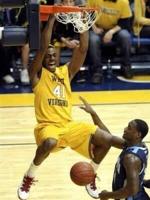I was a bit put off when Sen. Shelley Moore Capito, R-W.Va., announced Tuesday that she couldn't wait to confirm her son, former state legisla…
MORGANTOWN, W.Va. ā Below is another installment in this lengthy series with a countdown from Nos. 85-81.
* * * * * *
81 ā Lionel Armstead (1999-2002) ā Though just 5-foot-11, Armstead was an excellent offensive force in the final four years of the Gale Catlett era at WVU, averaging 10.7 points per game in his four-year career in which he totaled 1,083 points.
The Toledo, Ohio, native finished his Mountaineer career with 186 3-point baskets, which was second in school history at the time and currently stands ninth. Armstead was especially good against Marshall, topping the 20-point mark against the Herd three straight times in leading WVU to a trio of Capital Classic victories.
Armsteadās college career didnāt end well, though. West Virginia was just 8-20 his senior season, and Armstead was suspended for the final 11 games of the year.
82 ā John Flowers (2008-11) ā The energetic 6-foot-7 forward from Waldorf, Maryland, didnāt become a full-time starter at WVU until his senior season, but he was a key contributor to some of the best teams in school history. West Virginia earned trips to the NCAA Tournament every season Flowers was a Mountaineer, including a run to the Final Four in 2010.
Recruited to WVU by John Beilein, Flowers stuck with his commitment to West Virginia when Bob Huggins became head coach prior to him entering WVU. With the likes of DaāSean Butler and Joe Alexander dominating the playing time at the forward spots in the early part of his career, Flowersā minutes were limited his first couple of years, when he averaged 4.6 and 4.3 points per game.
By his senior season, Flowers blossomed into a starter, a good scorer (9.2 points per game), an excellent rebounder (6.2 per game) and an outstanding defender (74 blocks and 26 steals). His effervescent personality made him a fan favorite as well. Flowers has spent the past decade since the end of his WVU career playing professionally at spots all over the globe, including in Uruguay last season, where he averaged 14.5 points per game for Penarol Montevideo.
83 ā Joedy Gardner (1956-58) ā A 6-foot guard from Ellwood City, Pennsylvania, Gardner was a key player on some of the best Mountaineer basketball teams ever. Playing alongside Hot Rod Hundley his first two varsity seasons and then Jerry West his senior year, Gardner was asked to be more facilitator and defender than scorer during his WVU career, though he could certainly find the basket as well.
He scored 669 points in his varsity stint, topped by a 12.0 average his senior season. He had a career-high 27 points in a 99-86 win over Pitt that year. The Mountaineers had never earned a spot in the NCAA Tournament prior to Gardnerās freshman year at WVU, but they went all three of his varsity seasons and spent eight weeks of his senior year ranked No. 1 in the country.
Following his West Virginia playing days, Gardner joined the Marines, where he was a fighter pilot. After his time in the service, he began coaching basketball, initially as the head coach of Arizona Western College, before returning to his alma mater in 1974, where he was the head coach for four seasons and amassed a 59-53 record.
84 ā Mack Isner (1952-54) ā A 6-foot-4 forward from Elkins, Isner, along with Red Holmes, Jim Sottile and Eddie Becker, were the forces who kept Mountaineer basketball on steady footing (19-7 in 1952-53 and 12-11 in 1953-54) between the superstar spans of Mark Workman (1950-52) and Hot Rod Hundley (1955-57).
Isner was good offensively, averaging 11.5 points in his three varsity seasons, but it was on the glass where he was a real force. In his 74 varsity games, he averaged 10.1 rebounds per outing. Even now, well over a half century after his WVU career ended, Isner remains 17th on West Virginiaās all-time rebounding list with 749. His per-game-rebounding average is eighth.
His 31-rebound effort at Virginia Tech in 1952 still is the Mountaineersā single-game best, equaled only by Jerry West (31 boards at George Washington in 1960). Isner passed away in 2017 at the age of 85.
85 ā Harry Moore (1950-52) ā A 6-foot-2 forward from Moundsville, āMooā Moore proved to be the perfect complement beside one of the greatest Mountaineers of all-time, Mark Workman. Inducted into the WVU Sports Hall of Fame in 2007, Moore helped West Virginia to a 60-20 record in his three varsity seasons, including a 23-4 mark for coach Red Brownās club in 1951-52, which was just the second 20-win team in school history.
Moo averaged 9.0 points per game in his WVU career, including 12.8 as a senior, which was second that year behind only Workmanās 23.1. In a Southern Conference that featured schools that would split off after that season to form the ACC, WVU finished with a 15-1 regular-season league record but was denied its first-ever NCAA Tournament berth by virtue of a 90-88 loss to No. 12 Duke in the SoCon Tournament in Raleigh (only league champs got NCAA invites at that time).
Moore was a sixth-round NBA draft choice in 1952, but he went into the Army after his WVU graduation instead, where he played for an armed forces team in the Pan-Am games. The younger brother of three-term West Virginia governor Arch Moore, Moo passed away in 2018.
West Virginia Division of Highways workers went on strike in 1969. State schoolteachers struck in 1990, 2018 and again the following year. For…





